The German reply to Count Benedetti's defence of his master
and himself is final on the point of the Belgian annexation having been urgently pressed by Franco on Prussia in August, 1866, after the left bank of the Rhine had been demanded and refused. The German reply gives what purports to be the Emperor's letter to Benedetti, dated from Paris, August 16, 1866, instructing him to demand Luxembourg, and by a secret treaty to obtain the help of North Germany in the annexation of Belgium. "Your public agreement," wrote the Emperor, according to this account, " will be confined to the Duchy of Luxembourg, your secret treaty to the reunion of Belgium with France." In case " a clear and unmistake-
able reference to the incorporation of Belgium is found unpalatable,. you are authorized to assent to a clause in which, to obviate the inter- vention of England, Antwerp is deolared a free city." "Should Herr von Bismarck put the question, what advantage wouid accrue to• him from such a treaty, the reply would be that he would thereby secure a powerful ally, that he would consolidate his recent acquisi- tions, that he was only desired to consent to the cession of what does not belong to him, and that he makes no sacrifice at all to be- compared to his gains." If this letter be genuine, as it probably is, or the Germans would hardly publish it, it finally settles the question whether or not France only played the part of Eve to- Bismarek's serpent in the matter of Belgium,—" the serpent beguiled me and I did " (not exactly eat, but) intend to oat. The Emperor's tone assumes that to any connivance on his own part. Count von Bismarck would probably object.


































 Previous page
Previous page